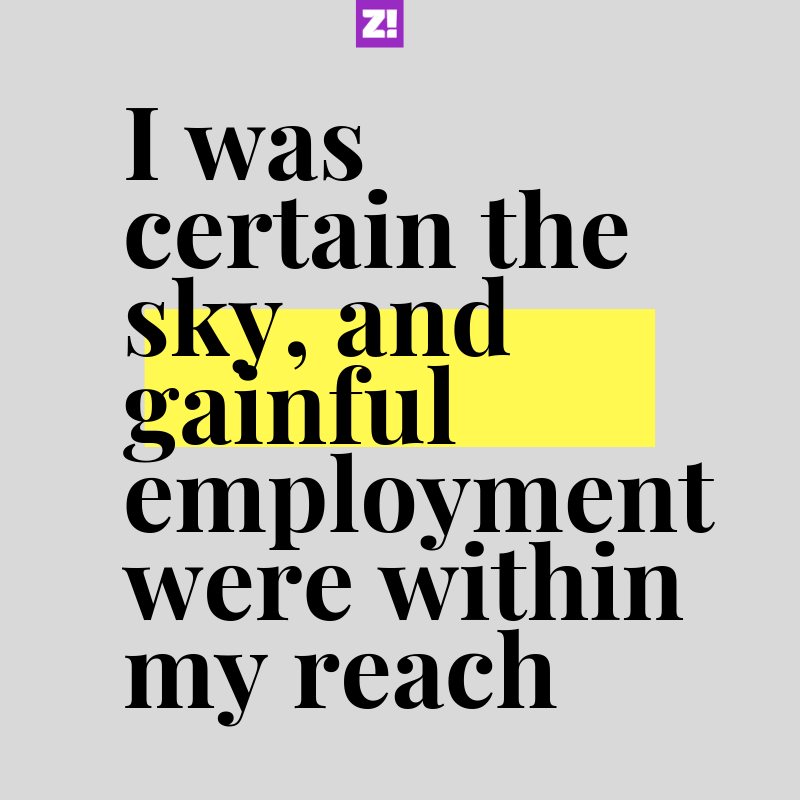I have survived 26 rotations around the sun. In that time, I have suffered through some of the worst Nigeria’s educational system has to offer and borne witness, first-hand, to the failings of the government to its people. If anyone knows a thing about disappointments and lemon conversions, it’s me. But for all of my resoluteness, nothing has quite prepared me for having the exit gates of Nigeria, repeatedly shut in my face through succinctly worded, visa rejection letters.
I felt the very first stirrings to leave the country in 2014. This was two years post-graduation. With a Business Management 2:1 in my bag, and a seal of determination yet to be tampered with by the Nigerian polity, I was certain the sky and gainful employment were well within my reach.

Spoiler — I was wrong.
When one year of belly-churning interview waiting rooms, online examinations, the occasional bottom-bare Skype interview and impersonal email rejections grew into two, it became imperative that I leave the country hell-bent on making me little more than an unemployment statistic. However, one afternoon’s gander at international tuition costs and accommodation fees, even at the ₦150 exchange rate, quickly convinced me to keep the fate in my job search and make things work regardless, intra-state.
In March of 2015, fortune, or what I imagined at the time to be fortune, finally smiled at me. I got selected to a graduate-trainee program at one of Nigeria’s leading banks. I was elated and convinced it was the start of something great in my life.
Spoiler – while, I wasn’t wrong, my aspirations were grossly overestimated.
Let me tell you a little something about my current role. Forget grand end of year bank parties and workers, advertised singing Christmas carols — when you are assigned to be a Customer Relations Officer at a Nigerian bank (my position for the past few years), here’s what you’re really signing up for: a 7 day work-week (weekend autonomy is forsaken for ATM duty and ad-hoc staff roles). Work hours that span between 7am and 7pm, together with the occasional dabble in street marketing to bring customers in. The bank also keeps an almost zero-tolerance stance on sick days, and if that isn’t enough, the good times are topped with a crippling uncertainty over the future, seeing as the promotion structure is restrictive at best and nebulous at worst.
All of this for the very beginnings of a six-figure salary. While the majority of my peers have begun the rites of marriage and starting families, both concepts are so foreign and far away from me as to be otherworldly.
For the past three years, this has been the summation of my work life and interactions. While I am ever grateful to not stare down the barrels of unemployment every morning; there’s nothing quite like living your life as a series of ‘justs’ to make you aware of how bleak Nigerian futures promise to be. “Just keep the job, who knows what God has planned for the future?” “Just marry now, money will come later”. “Just keep the faith, everything else will fall into place”. The uncertainty is exhausting. I’ve seen the job market, I know Nigeria’s economic projections, I have seen the future of Nigeria for me, and it holds no real promise. I want out.

On the advice of a mentor already settled in Canada, I resolved to apply for a student visa. My hopes lay in earning an MBA, with a subsequent work permit to begin the process of integrating legally into Canadian society. My jail-break from Nigeria was finally in motion.
Armed with a valid passport, my admission letter to a University in Ottawa, WAEC and NYSC certificates, a copy of my transcript and a Statement of Account I believed sufficient to encompass school fees and consequential costs, I made my first application to the Canadian embassy in April of 2018.
I won’t get into having to freeze my expenses for anything that wasn’t life-threateningly important to raise the necessary fees. Or having to ask my retired parents and working siblings to chip in when my frugality couldn’t suffice. I won’t even dwell on the fresh hell of retrieving my University transcript, only to be told I had an outstanding course by the school management, 6 years post-graduation; but I will speak a little on the non-refundable visa fees I have had to expend on this exit strategy of mine.

.
At my last count, I have spent upwards of ₦200,000 on 4 non-refundable visa application fees. That’s a full month’s salary, plus substantial change, all to be told an unceremonious no. I concede it’s necessary to the process, but I imagine I am not alone in thinking a downward fare review would be invaluable to Nigerians, especially when the rate of denials is put into consideration.
When I got my first rejection letter from the Canadian embassy in June of 2018, about 8 weeks after applying; the most inconsequential things popped into mind within the first minute. First, that I wouldn’t be using the resignation letter already typed up and sitting in my drafts – just yet. And second, a wanton giggle at the memory of mouthing a strong “AMEN”, when the security guards at the visa application office, asked if I was headed to Canada.
Shortly after came the overwhelming feelings of despondency. Fears I had been grappling with reared their heads: would I never have the chance to leave the country? Was I fated to continue at this job forever? Seeing as previous attempts at finding new employment had proved abortive? What could my next steps be? I read through the reasons for the denial — an absence of strong ties to Nigeria, dismal travel history, the shortage of funds and the fear that I wouldn’t return to Nigeria if given the opportunity — so much, they just might be etched in my brain.
After permitting myself some time to sulk, I began to consider the appropriate courses of action to re-applying for a Canadian visa.
Per the rejection email — I couldn’t get married just yet to create strong ties. More funds could be pooled from family to suit their financial requirements, while there was nothing I could do to allay their fears of remaining in Canada.
I resolved to build a travel history, using money I would much rather have channeled towards my schooling, to better my chances.
I applied for a visiting visa to the US in July of 2018, together with a mammoth crowd of people looking for an out — whether temporary or permanent.
At precisely 9:15am, my interview began in full view of other Nigerians craning to hear what was asked, to better prepare themselves for their round. Following a series of questions, a blue parcel was slipped into my hands — my ₦76 000 application had been denied before 9:30 am.

Keeping with the denial streak, my visa application to the United Kingdom was also rejected in December of 2018. This was thankfully remedied by an approval to visit Dubai in the same month. By which time, through the help of family and more savings, a substantial increase had been made to my account balance.
Fast forward to February 14th 2019 when — bolstered by a swollen account balance, and some travel experience, I tried my hand and applied to the Canadian embassy to have another chance at a needed life change.
For the second time, I paid a non-refundable application fee to study in my chosen University, again I paid out ₦63,520 for the visa application fee. Gathered all the prerequisites, and made sure to keep a solemn nod when asked if by the security guards if I was headed to the Canadian and not the South African office.
With more hope than I should reasonably have allowed, I waited to hear back from the embassy. Going against my better judgement, I spent an unspeakable amount of time bingeing on YouTube videos of life in Ottawa and Ontario, planning for my life there. When I got the email, on April 13th 2019, requesting that I return to the embassy to retrieve my Passport, without an accompanying directive to proceed to medicals (as an approved application would have requested) I felt that same despondency attempt to rear its head; but I allowed no room for it.
Instead, I am choosing to focus on only the positives, viewing the rejections as an opportunity for some introspection and of course, a chance to raise more money.
Because, while the goal hasn’t been shifted, the goal post may have been subjected to some change.

These days, you can find me returning from a day’s work spent conversing strictly in English, to spend my time poring over IELTS practice materials. No, a sudden need to certify my ability to speak the English Language didn’t come over me; but I am setting my sights on Dublin, where I hope the luck of the Irish will favour a Nigerian just looking to lead a better life.
*This story was written on behalf of the protagonist. Some events have been modified to protect their identity.




